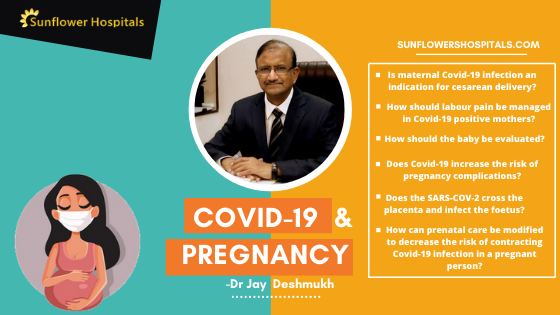Does Covid-19 increase the risk of pregnancy complications?
Certainly infected women, especially those who develop pneumonia appear to have increased frequency of preterm birth, that is before 37 weeks of gestation and cesarean delivery. Are pregnant women more susceptible to Covid-19 or are at a higher risk of complications due to Covid-19? Limited data available suggests that pregnant women are not at increased risk of getting Covid-19 infection with or without symptoms. They may have increased severity of illness as compared to others of similar age. However, most of them recover without undergo-ing premature delivery and the death rate is not increased.
Does the SARS-COV-2 cross the placenta and infect the foetus?
There is no evidence that the virus crosses the pia-centre and infect the foetus. However, few cases have been reported. Those who get infected are generally reported to have mild disease.
How can prenatal care be modified to decrease the risk of contracting Covid-19 infection in a pregnant person?
The traditional protocols of prenatal care need to be modified. Person to person contact needs to be limited. Low risk versus high-risk pregnancies needs to be categorised. Those with hypertension, diabetes or with multiple gestations need to be looked after with the greatest of care. The timing and care took during blood tests and other screening procedures like ultrasound and no need to be modified.
Is maternal Covid-19 infection an indication for cesarean delivery?
No Covid-19 is not an indication for cesarean delivery. Even if transmission to the fetus is considered as new additional data emerge, the cesarean section is likely to increase maternal risk and may not improve newborn out-come.
How should labor pain be managed in Covid-19 positive mothers?
To reduce stress on the heart and lungs due to pain and anxiety a neuraxial anesthetic is generally preferred. Limiting the use of nitrous oxide and intravenous analgesics is recommended.
How should the baby be evaluated?
If the mother is known Covid-19 the baby becomes a Covid-19 suspect. The baby should be tested for the virus, isolated from other healthy infants, and should be cared for according to infection control precautions.
Should the mother with Covid-19 be separated from her baby?
The newborn’s risk to acquire infection from the mother is low, hence the baby should not be isolated or separated from the mother. However, the mother should wear a mask and observe hand hygiene during contact with her baby. The physical distancing of more than 6 feet between the mother and neonate, or placing the baby in the incubator is desirable if feasible.
1-low long should mother-baby precautions continue at home after a recent infection?
At least 10 clays should have passed since their symptoms first appeared. If their symptoms have improved or they are with-out fever and without antipyretic drugs for at least 24 hours is an important consideration. A period of 19 days after the onset of symptoms may be a safe option.
Can breast milk transmit the virus to the baby?
There is no clarity on this issue. However in a study carried out by WHO, in 43 breast milk samples of infected mothers the virus was not detected, while 3 tested positive. Hence the present recommendations are to provide the infant with mothers milk.
What precautions should mothers with confirmed or suspected Covid-19 take when breastfeeding?
Droplets infection can occur through close contact during breastfeeding. Mothers should take precautions to prevent this by performing hand and breast hygiene and using a face mask. Alternatively, the infant can be fed by expressed breast milk by the health provider. The birth of a baby is the best moment in a mother’s life. In this pandemic, it will continue to be so if adequate precautions are taken by the individual patient, her health provider and her close relatives.

